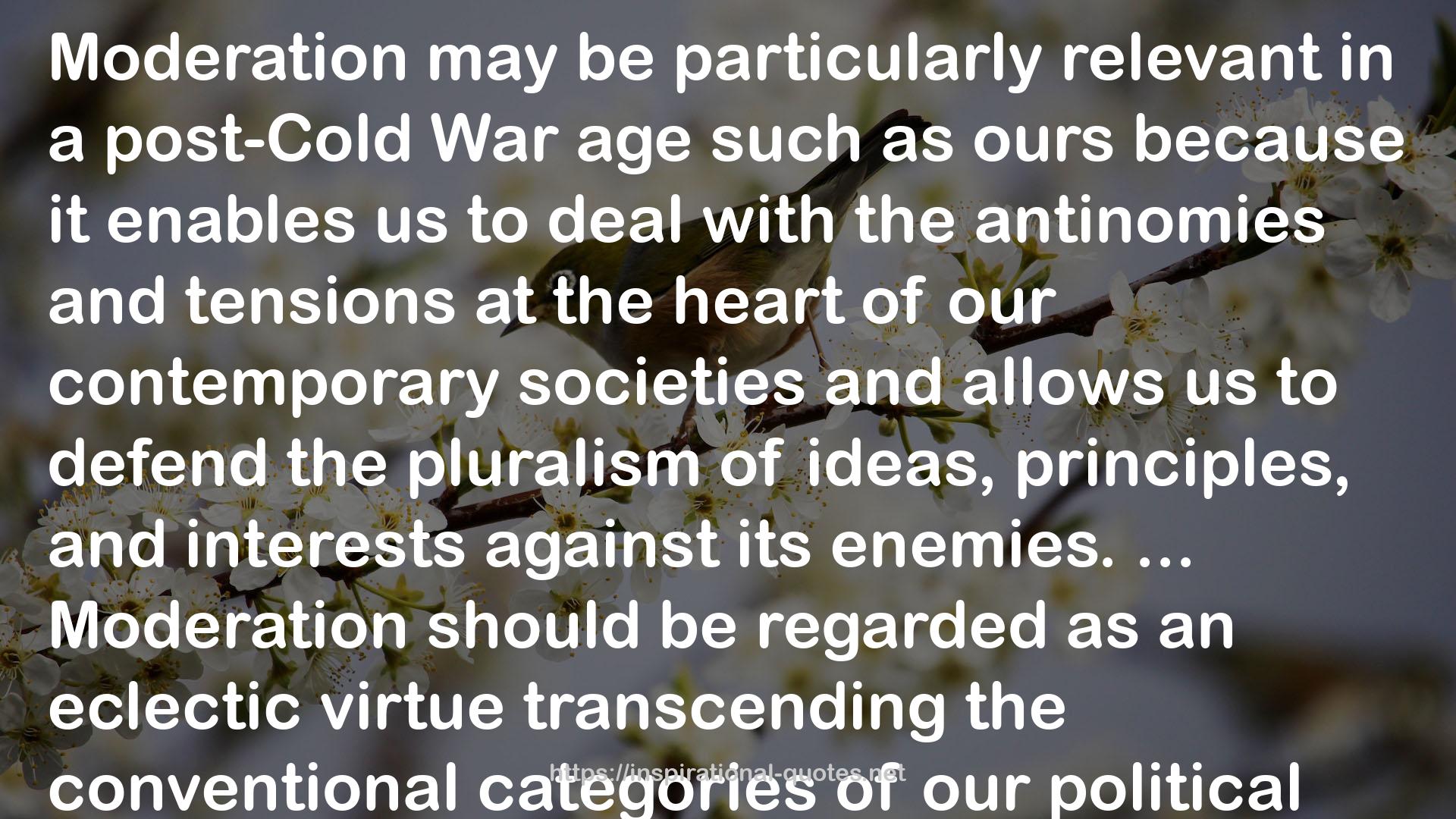4
" It was assumed that entire societies could be transformed and changed in a relatively short span of time if only enough people were prepared to accept and follow the principles and priorities set by a vanguard in possession of those timeless standards. The only things that remained to be done, [Isaiah] Berlin wryly noted, was to eliminate all obstacles (human and material) to progress before the process of building the radiant future could begin in earnest. This could be done in one step through violence or gradually through persuasion, threats, reeducation, disenfranchisement, dispossession of property, relocation, coercion, blackmail, denunciation, and, if necessary, terror. "
― , Faces of Moderation: The Art of Balance in an Age of Extremes
8
" One of the best means of preserving the balance of political community and promoting the necessary social and political changes is by keeping the dialogue open with all the political actors who accept the basic rules of the game and are committed to preserving the basic values of the society. This ... explains why many of the thinkers studied in this book, from [Raymond] Aron and [Norberto] Bobbio to [Adam] Michnik, successfully practiced the art of dialogue across the aisle and refused to see the world in black-and-white contrasts. If they adopted the role of committed or engaged spectators, they also maintained a certain degree of detachment and skepticism in their attitudes and political judgments. Their invitation to dialogue and their willingness to speak to their critics illustrated their courage and determination not to look for 'safe spaces' and lukewarm solutions. Instead, they saw themselves as mediators whose duty was to open a line of communication with their opponents who disagreed with them. The dialogue they staged was at times difficult and frustrating, and their belief in the (real or symbolic) power of discussion was an open act of defiance against the crusading spirit of their age, marked by political sectarianism, monologue, and ideological intransigence. Aron and the other moderates studied here were convinced that we can improve ourselves not so much by seeking a fictitious harmony with our critics as by engaging in an open debate with them, as long as we all remain committed to civility and rational critique. In this regard, they all acted as true disciples of Montaigne, who once acknowledged that 'no premise shocks me, no belief hurts me, no matter how opposite they may be. ... When I am contradicted it arouses my attention not my wrath.' This is exactly how Aron and other moderates felt and behaved. They were open to being challenged and did not shy away from correcting others when they thought fit. Yet, in so doing, they did not simply seek to refute or defeat their opponents' arguments, being aware that the truth is almost never the monopoly of a single camp or group. "
― , Faces of Moderation: The Art of Balance in an Age of Extremes
13
" Democracy, [Adam] Michnik explained, 'is neither black nor red. Democracy is gray. It is established only with difficulty, and its quality and flavor can be recognized best when it loses under the pressure of advancing red or black radical ideas. Democracy is not infallible because in all debates all are equal. That is why it lends itself to manipulation, and may be helpless against corruption. That is why, frequently, it chooses banality over excellence, shrewdness over nobility, empty promise over true competence. Democracy is a continuous articulation of particular interests, a diligent search for compromise among them, a marketplace of emotions, hatreds, and hopes; it is eternal imperfection, a mixture of sinfulness, saintliness, and monkey business. "
― , Faces of Moderation: The Art of Balance in an Age of Extremes
14
" The person of dialogue attempts to transform the enemy into an opponent and the opponent into a partner. An opponent is for him one who presents challenge, who wants and asks to be understood. The person of dialogue believes that dialogue is the only way to be understood by others. So he makes an effort to look at the world through his opponent's viewpoint, to 'change hats with him' and to 'step into his shoes.' ... He does not shy away from defending his own arguments and is not afraid of the truth, but, invariably, he puts respect for human dignity first. ... Each partner accept that the dignity of the other is of immensurable value. This presupposes the ability to strike a compromise, whenever possible, the readiness to admit that one is not is possession of the sole and complete [truth], and the willingness to accept somebody else's reasoning and to change one's own attitudes. (Quoted from Adam Michnik, In Search of Lost Meaning.) "
― , Faces of Moderation: The Art of Balance in an Age of Extremes

